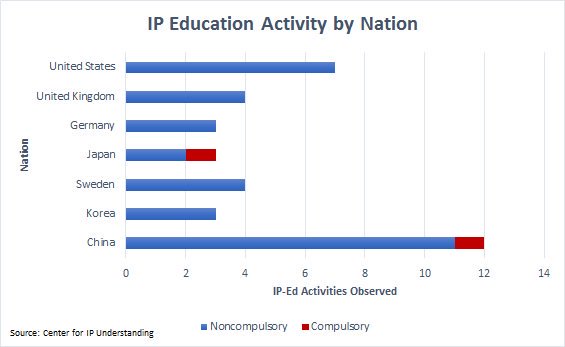China has come a long way in many areas of innovation and technology, including intellectual property education for which it has assumed a leadership position.
That might not be saying much given the level of non-lawyer IP education worldwide, but it is an accomplishment that leading nations need to take seriously. The increasing importance of IP rights and intangible assets to economic well-being, and the rising rate of infringement, require it.
China is playing catch-up in innovation and IP rights, including brands — both creating and respecting them, and appears to be instituting activities to speed the process. By the end of 2018, China had assessed a total of 165 primary and secondary schools as IP pilot schools in China, 25 as IP demonstration schools and almost 1,000 as IP pilot schools at provincial level.
This is for as much an attitudinal change as a need to have its own IP.
“China’s IP education is among the best in the world,” it was reported recently in Xinhuanet, the online presence of the world’s largest news agency. The article cites a report by the U.S. Center for Intellectual Property Understanding (Activities tab – Reports) listing China as among seven top countries for IP education along with the United States and Japan.
The article reports that the IP learning curve is flattening. The High School affiliated with Renmin University of China is one of the IP pilot schools in Beijing. The teachers have written textbooks and started dozens of compulsory courses on patents, trademarks and copyright since 2005.
Changing Methods
But they had difficulty teaching abstract IP concepts, “which are far from students’ lives”, said teacher He Lingyan. “Few students could understand or remember.” So they changed their methods, raising examples of iPhones and shared bikes, which students are familiar with, explaining the IP involved and studying patent dispute cases.
While some doubt the necessity of IP education at primary or secondary school, as IP is mainly a commercial field, Li Zuolin, head of the school’s IP teaching group, argues it is “necessary and urgent”.
Not long ago, Li went to the United States to attend a science and technology education seminar, where a well-known international publisher offered a free set of popular science books for young people. When Li asked for a set, the publisher refused because the books had been pirated on the Chinese mainland.
“I was so embarrassed,” Li recalled. “It made me feel once again the importance of IP education, which should be stepped up and start with teenagers.”
A recent article in IP CloseUp, “China’s High School Students Learn About IP Rights; National Exam Tests for Knowledge,” notes that 10 million high school students were queried about IP rights on this year’s national college entrance exam.
IP is something that China wants to take seriously, and that should encourage the U.S. and other nations to do so. It remains to be seen if a a country built on central control and committed to limiting property ownership be an innovation leader.
Widespread Infringement
Despite stepping-up in IP education, counterfeits, patent and trade secret infringement continue to be widespread in China, and IP courts unreliable, especially for foreigners.
Hua Bing, founder of a Chinese IP information consulting company, said in the Xinhuanet article that he finds that despite China’s IP progress, many people still lack respect for IP rights, including business executives and researchers.
“They do not care about infringement or even being infringed, because people of my generation and previous generations grew up with very limited exposure to IP concepts,” said Hua. China’s patent law was published in 1985, and people a decade or two older are unfamiliar with IP.
Children Can Influence Parents
“I really think it’s necessary to cultivate awareness of IP protection from a young age,” said Hua. “When children receive IP education and participate in related activities at school, they might influence their parents at home, which will gradually improve the whole society.”
The complete feature article, “IP Education Focuses China’s Young Minds,” can be read here.
Image source: understandingip.org


2 comments